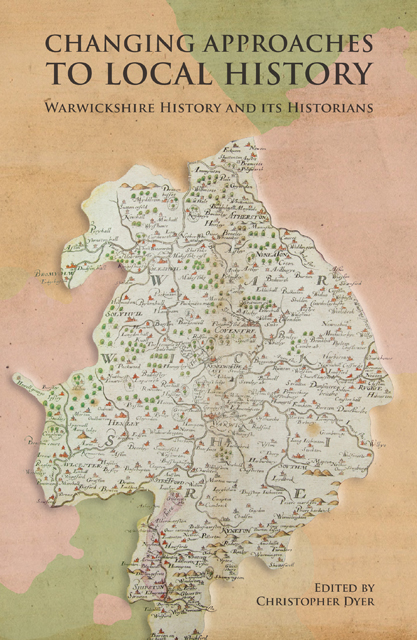Book contents
- Frontmatter
- Contents
- List of Illustrations
- Notes on Contributors
- Foreword
- Acknowledgements
- List of Abbreviations
- Introduction
- 1 The Dugdale Society: Its First Hundred Years
- 2 The Beginnings of Coventry
- 3 Was Commerce in Late Medieval Coventry Restricted by Regulation?
- 4 Studying Late Medieval Small Towns in Warwickshire 1920–2020
- 5 Rural Warwickshire in the Middle Ages: Society and Landscape
- 6 Religion, Rebellion and Red Jackets: Changing Approaches to Society and Politics in Sixteenth-century Warwickshire
- 7 Social Networks, Intellectual Affinities and Communal Harmony in Post-Reformation Warwickshire
- 8 Discovering Warwickshire’s Vernacular Architecture
- 9 Local History and the English Civil War: A View from Warwickshire
- 10 Writing Histories of the Landed Elite in Georgian Warwickshire
- 11 The Victoria County History in Warwickshire
- 12 Writing Women into the Political History of Warwickshire
- 13 Shakespeare and the Warwickshire Landscape in the Age of the Tourist
- Conclusion
- Index
12 - Writing Women into the Political History of Warwickshire
Published online by Cambridge University Press: 17 December 2022
- Frontmatter
- Contents
- List of Illustrations
- Notes on Contributors
- Foreword
- Acknowledgements
- List of Abbreviations
- Introduction
- 1 The Dugdale Society: Its First Hundred Years
- 2 The Beginnings of Coventry
- 3 Was Commerce in Late Medieval Coventry Restricted by Regulation?
- 4 Studying Late Medieval Small Towns in Warwickshire 1920–2020
- 5 Rural Warwickshire in the Middle Ages: Society and Landscape
- 6 Religion, Rebellion and Red Jackets: Changing Approaches to Society and Politics in Sixteenth-century Warwickshire
- 7 Social Networks, Intellectual Affinities and Communal Harmony in Post-Reformation Warwickshire
- 8 Discovering Warwickshire’s Vernacular Architecture
- 9 Local History and the English Civil War: A View from Warwickshire
- 10 Writing Histories of the Landed Elite in Georgian Warwickshire
- 11 The Victoria County History in Warwickshire
- 12 Writing Women into the Political History of Warwickshire
- 13 Shakespeare and the Warwickshire Landscape in the Age of the Tourist
- Conclusion
- Index
Summary
The attention of most political histories of Warwickshire in the long nineteenth century has been centred on Birmingham. That is not to say that other areas of the county have been neglected. In particular, the tangled politics of Coventry as it made the transition from a freeman borough to a post-1832, £10 householder franchise, have been explored, focusing on aspects such as the paternalism of the town’s corporation and the role of the Municipal Reform Act in diminishing corruption in the town. But it is Birmingham, with its large electorate and engaged population, which has fascinated scholars, most of whom have viewed the city as a pioneer in many aspects of the political life of nineteenth-century Britain. Yet these political histories have largely been written with a masculinist lens, echoing the voice of John Bright, the radical MP for the city in the mid-Victorian period:
Am I not in the town of Birmingham – England’s central capital, – and do not these eyes look upon the sons of those who, not thirty years ago, shook the fabric of privilege to its base? Not a few of the strong men of that time are now whithered [sic] with age… Shall their sons be less noble than they? … I see the answer in every face. You resolve that the legacy which they bequeathed to you, you will hand down in an accumulated wealth of freedom to your children.
Bright’s inaugural address to an adoring Birmingham public at the Town Hall in October 1858 came after he had been elected unopposed as one of the two members for the city, a position he held until 1889. Thousands of men and women attended the event, which was followed by a banquet hosted by the great and the good of the city. Bright alluded to Birmingham’s radical past, and in particular its role in pressuring, via the Birmingham Political Union, for the passage of the 1832 Reform Act. But he also spoke to the sons of the ‘strong men’ of the 1830s, calling on them to continue the fight for parliamentary reform. This focus on the ‘great men’ of Birmingham’s political life is a common theme in political histories written since Bright’s stirring appeal.
- Type
- Chapter
- Information
- Publisher: Boydell & BrewerPrint publication year: 2022

